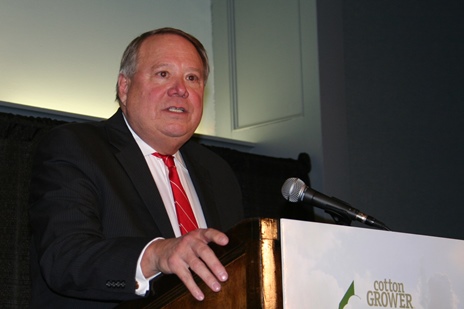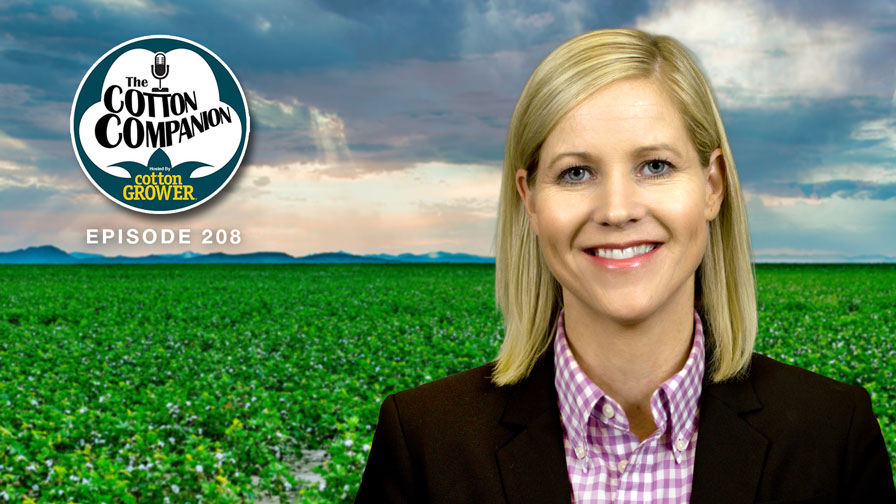Seven Days in December
On Dec. 21, 2024, President Biden signed into law H.R. 10545 — the “American Relief Act, 2025” — a continuing resolution that, among other things, kept the U.S. government funded through mid-March, provided funds for disaster relief and economic assistance for farmers, and renewed the 2018 Farm Bill for another year.
What’s not visible are the political maneuverings of the prior week to not only keep the government from shutting down but also to rescue — again and again — much-needed relief packages critically important to farmers and others in financial need due to no fault of their own. The National Cotton Council (NCC) was in the midst of it all that week, working to protect the U.S. cotton industry during some uncertain days (and nights).
In early January, Cotton Grower met with NCC President/CEO Gary Adams, current NCC Chairman Joe Nicosia, and NCC Vice President, Washington Operations Robbie Minnich to discuss the what’s, how’s (and sometimes why’s) of their strategies and decisions during those seven days in December.
Adams: “The NCC organized a September fly-in with other commodity groups, Farm Credit Services, and the American Bankers Association for roughly 100 meetings with staff on Capitol Hill. That really built awareness of how tough things were across all of agriculture, not just cotton.”
Nicosia: “I was aware that other commodities were struggling as well, and we started to hear about difficulties regarding financing. That spawned the idea of the fly-in with a broader coalition to tell the story. It was crossing outside of agriculture and into finance, which could have spiraled into a lot of problems for communities, banks, and other things.”
Minnich: “The group did about 100 meetings on Capitol Hill, and we organized a letter signed by more than 300 groups. That laid the foundation for the economic assistance package because, at that point, people became aware that it wasn’t a singular ask, but was truly an industry-wide, agricultural issue.”
Adams: “We had to make sure they understood that this was something that was going to be critical for farmers to wrap up 2024 going into 2025. We continued that message through the fall and felt like we were in good shape in terms of getting some type of assistance in the end–of–year package.
“Robbie called me at 10 o’clock:00 that Friday night (Dec. 13) when the package fell apart, and we realized things were not tracking due to disagreement about how the assistance was going to be structured and how it was going to be funded.”
Minnich: “We knew senior leadership (McConnell, Johnson, Schumer, Jeffries) and their staffs would be deciding what’s in and what’s out. During our lead up, we made sure that Speaker Johnson, since we already had a preexisting relationship with him, really heard that message often.
“In the end, it blew up on that on that Friday. It’s politics. If you’re going to get something you want, I have to get something. That night, unfortunately, they couldn’t come to an agreement, and they said no one gets anything they want. That put us in the position on Saturday (Dec. 14) when Joe convened our industry leadership to walk them through the situation and think through our next steps.”
Adams: “We must have convened the executive committee four times between Saturday and Thursday, issued two action alerts, and debated a third one.”
Minnich: “On Friday evening, I contacted other commodity groups about how they were going to react. We felt confident about how cotton was going to react. Using the relationships we’ve built on the Hill, I was in contact via texts and calls that Saturday morning with key members of Congress, basically saying, ‘You have to figure this out. We’re getting our board together and we’re probably going to oppose this. I don’t want our industry to be there, but that’s where we’re going to have to be.’”
Nicosia: “We concluded that no bill was better than a skeleton or bad bill. We were better off to see no bill take place than to lose the whole opportunity to move forward with the economic assistance.”
Adams: “The members of our executive committee were strong on this message. If this is the hill we have to die on, this is where we have to be. If it takes submarining a package to fund the government, then that’s what we’ve got to do.”
Nicosia: “It wasn’t a difficult decision because, as we had shared through multiple meetings to with Congress, there’s a difference between an ask and a need. We made sure they understood that this was not an ask. This need had larger economic ramifications than just an individual grower’s situation.”
Minnich: “We were able to revive the assistance programs and get them back into the package on Monday (Dec.16). No one was sure what was going to be in at that point. We just kept telling leadership that, no matter what, they have to take care of our farmers in this.”
Adams: “It was out and back in, and then it came down to the votes. On Tuesday night (Dec. 17), an agreement was reached that had a lot of ask in it. Farm assistance was there and so was the extension of the farm bill.”
Minnich: “But many members of Congress, including some of our strong supporters, expressed concerns about some provisions not related to agriculture in the bill, and it was voted down on Wednesday (Dec. 18). The bill that failed was 1,550 pages long. The final one — that we weren’t sure we were in or not — was about 156 pages. A lot of stuff got cast to the wayside.”
Adams: “The text strings on Robbie’s phone show direct dialog back and forth with members of Congress at all hours of the day — evening and night — on where things were standing at any given point in time. That’s how we had to stay on top of how things were unfolding.”
Minnich: “Some of these meetings wouldn’t start until 10 o’clock at night. At one point, I was talking to the leadership of one of the ag committees at 1 o’clock in the morning. Because most of the decision making is going on in a closed meeting that we’re not going to get access to, we had to ping some the staff that were in the know.
“Towards the end, I felt fairly confident that the aid was going to be there. But, at one point on Thursday (Dec. 19), separate votes were being considered for the Continuing Resolution, disaster aid, and the farmer economic aid, which meant economic assistance would then be standing on its own to pass or fail, which could have been more of a challenge.”
Nicosia: “One of the dynamics that ultimately helped passage was that the natural disaster aid crossed many different parts of the United States over both Republican and Democratic states. The ability to keep the economic and the disaster packages bipartisan provided good political capital for everybody.”
Adams: “In the end, we got a lot of what we needed, and this is certainly going to help. We’ll now follow up with USDA to make sure it’s implemented in the manner Congress intended, then focus on trying to figure out the best farm bill process.”
Nicosia: “We have good people at the National Cotton Council working to advocate for our industry, and that takes time and commitment. I know people sometimes wonder what’s taking place and what’s happening. It’s times like this that you really see the benefit.”









